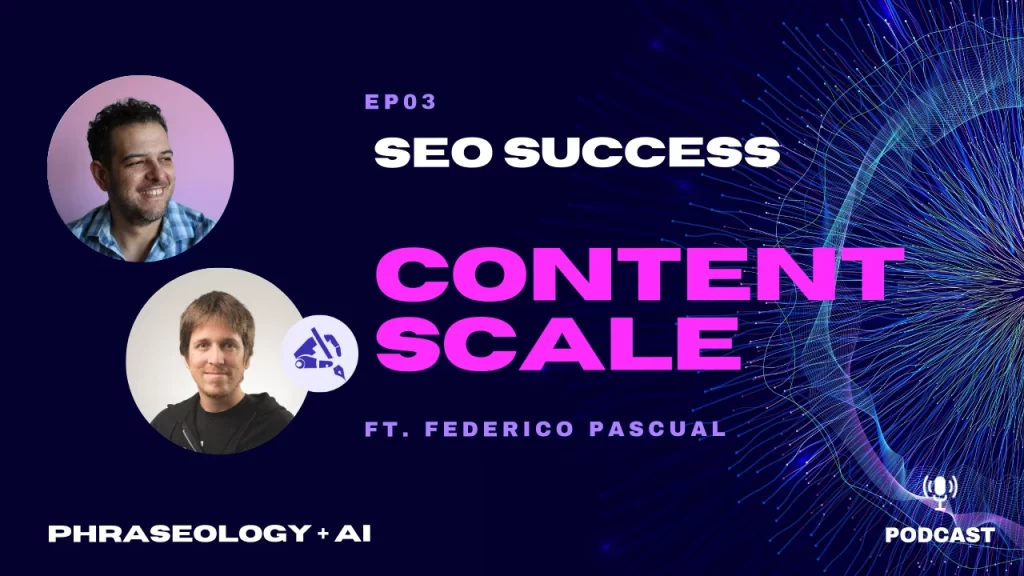Table of Contents
- Introduction
- Understanding Generative AI Models
- Tokens and Prediction Speeds
- Real-time AI Applications
- The Role of Smaller, Specialized Models
- Collaboration Between Humans and AI
- Overcoming AI Limitations in Content Creation
- SEO Optimization with AI
- Future of AI in Digital Marketing
- Conclusion & Key Tips
Introduction
In Episode 3 of The PhraSEOlogy + AI Show, our host, Filipe Santos, had an astoundingly insightful conversation with Federico Pascual, a seasoned AI expert and co-founder of Wordcrafter AI. With over a decade of experience both in AI and SEO, Federico shared his invaluable insights about generative AI models and their applications in SEO and content creation. If you want to understand the crossroads of AI and digital marketing, this episode is your guide.
Understanding Generative AI Models
[Timestamp 03:15]
Federico Pascual opened the episode by breaking down the mechanics behind generative AI models like ChatCPT and Gemini. Such models have revolutionized our understanding of predictive text, generating coherent and contextually accurate content.
“Generative AI models are essentially prediction engines. They predict the most likely word from a given text, creating sentences and paragraphs that seem almost human-like,” Federico explained. This predictive capability powers many applications we use today, from chatbots to auto-completion tools.
Tokens and Prediction Speeds
[Timestamp 08:42]
The discussion took a deeper dive into the building blocks of AI-generated text: tokens. Federico explains, “In AI terminology, tokens can be parts of words, and the speed of generating text is measured in tokens per second”. This metric is crucial as it denotes how quickly an AI can respond to user inputs.
Real-time AI Applications
[Timestamp 12:10]
One of the significant hurdles AI developers face is the trade-off between model complexity and response time. Federico highlighted the need for speed in real-time applications, saying, “Slower responses can significantly degrade user experience. In today’s fast-paced environment, milliseconds matter.” This emphasizes the importance of balancing performance with computational efficiency.
The Role of Smaller, Specialized Models
[Timestamp 16:34]
Federico shared his perspective on why sometimes smaller, specialized models can be more effective than larger ones. “Smaller models tailored for specific use cases can achieve similar accuracy at a lower cost,” he noted. This approach allows businesses to harness AI benefits without the need for extensive computational resources.
Collaboration Between Humans and AI
[Timestamp 22:56]
The episode also explored the collaborative potential of AI and humans in content creation. Federico illustrated this with Wordcrafter AI, which allows AI to initiate the content creation process while humans fine-tune and iterate upon it. “AI offers a framework; how you build on that framework is the role of human creativity and expertise,” he emphasized.
Overcoming AI Limitations in Content Creation
Timestamp 28:47
A significant challenge with current AI models is their lack of memory and understanding of new information. Federico pointed out, “Though AI can generate contextually correct content, it cannot store or recall new information. Hence, feeding previous interactions into the model remains a current workaround.” This limitation particularly impacts dynamic industries such as SEO and content marketing.
SEO Optimization with AI
[Timestamp 34:22]
Through Wordcrafter AI, Federico has tackled some of the longstanding challenges in SEO. He detailed the grueling task of manual research in search intent and topics, explaining how AI can streamline and speed up these processes, making them more effective.
“High-quality content isn’t just about keyword density,” Federico remarked. “It’s about matching search intent and offering real value, something AI can be exceptionally good at when properly guided.”
Future of AI in Digital Marketing
[Timestamp 42:05]
The conversation then pivoted to the future prospects of AI, especially in digital marketing. Federico expressed optimism but also emphasized caution: “While AI tools are becoming increasingly sophisticated, understanding how to wield them effectively remains paramount.” This statement underscores the necessity of continued education and adaptation as AI technology evolves.
Conclusion & Key Tips
[Timestamp 48:30]
In the episode’s closing moments, Federico shared invaluable advice on leveraging AI effectively in your work.
5 Key Tips on Using AI Effectively for Work:
- Understand Your Tools: “Before diving into AI, understand the specific model you’re using and its capabilities. Tailor it to your needs to get the best outcome.”
- Focus on Collaboration: “AI should augment, not replace, human creativity. Use AI for initial drafts and frameworks, but rely on human expertise for the final iteration.”
- Utilize Specialized Models: “Don’t always go for the largest model. Smaller, specialized models can often provide similar accuracy faster and cheaper.”
- Streamline SEO Processes: “AI can automate arduous tasks like keyword research and content topic identification, freeing up time to focus on quality.”
- Stay Updated: “The field of AI is ever-evolving. Keep abreast of new advancements to refine and enhance your strategies continually.”
The third episode of The PhraSEOlogy + AI Show, with Federico Pascual, illuminated AI’s transformative potential in SEO and content creation. As AI technologies advance, understanding how to harness their capabilities effectively remains imperative for businesses and individuals.
From AI’s inner workings to practical applications and future implications, this episode offered a treasure trove of insights and actionable advice. Stay tuned to The PhraSEOlogy + AI Show for more in-depth discussions and expert interviews.
Feel free to contact Federico Pascual and explore Wordcrafter AI on their website to see how AI can revolutionize your content creation and SEO strategies.

